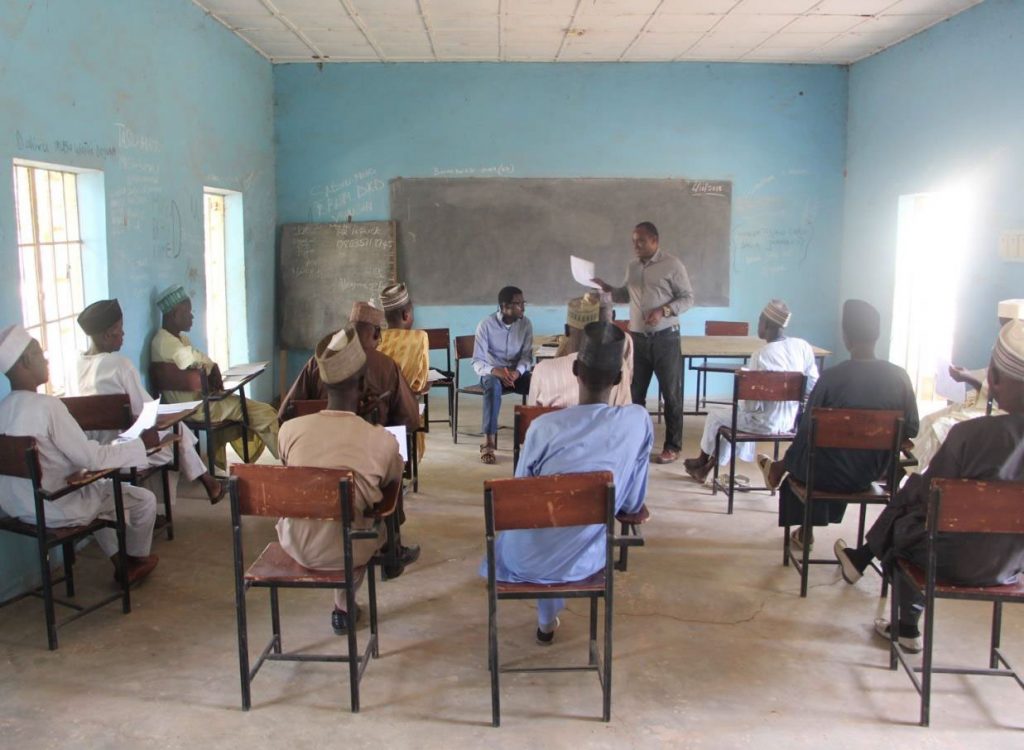BOOSTING WHEAT PRODUCTION IN NIGERIA
TAAT-WEC demonstrates irrigation management technologies to boost wheat production in Kano State. This agricultural seasonal water use is expected to decrease by 10-15% and wheat productivity will increase by 25%. Kano State is a major wheat production centre in Nigeria that was selected in consultation with the Wheat compact. After identification missions to several zones, two sites were selected: in Kadawa irrigation scheme and Alkamawa village; the latter, meaning the Wheat village when translated from the local language. Farmer participation and interest in irrigation technologies were found high and both are major wheat zones.
The compact has linked with two innovation platforms that are active. After discussions it was decide to scale three proven technologies in the Kadawa irrigation scheme in year 1: 1) mechanized land levelling, 2) bed furrow irrigation, and 3) weirs for accurate water management application, and three technologies in the Alkamawa area: 1) pressured water lifting, 2) check basin, and 3) border strip systems. The demonstration sites are developed and supervised by IAR.
In total 38 farmers are directly involved in the demonstration of the technologies, while approximately 200 farmers that are member in the IPs are targeted. However, the project partnered with the Water Users Association in the Kadawa Irrigation Scheme where 4,000 farmers can potentially adopt demonstrated technologies. In Alkamwa are some 2,000 farmers will be targeted. Wheat farmers will be engaged in farmer field days and receive trainings. Moreover, the project has partnered with the Kano Agricultural Development Programme to further scale the technologies within the two selected zones and beyond. Their field agents, together with lead farmers, will be trained in 2019 Q1 in aforementioned six technologies.

BOOSTING WHEAT PRODUCTION IN SUDAN
TAAT-WEC established two demonstration sites to increase wheat productivity in Sudan: the Gezira Scheme and Partnerships were established with a wide range of organizations from research to private companies and include: Hudiebea Research Station, CTC (chemical and input supplier) River Nile and Gezira Farmers IPs, Hydraulic Research Center (HRC) of Ministry of irrigation and water resources (MIWR), Gezira University, Micro-finance foundation (NGO), WUAs, Irrigation administration of Gezira Scheme (MIWR), and the Extension and technology transfer organization of the Gezira Scheme.
Both demonstration sites are located within large irrigated schemes and TAAT-WEC scales three proven irrigation technologies: 1) mechanized land levelling, 2) weirs for accurate water application, and 3) optimized irrigation scheduling for maximizing yields. The project currently engages 120 wheat farmers. Moreover, ten extension agents from the Ministry of Agriculture were trained, ten researchers were trained, and 40 pioneer/lead farmers received training in irrigation scheduling.
Given the strong ties with a variety of organizations, it expected that some 4,000 farmers will benefit from the irrigation technologies. ARC, the national partner, is involved in the national wheat development program and TAAT-WEC achievements will be potentially be included in the national program.
BOOSTING WHEAT PRODUCTION IN ETHIOPIA
Two wheat producing states are targeted by TAAT-WEC in Ethiopia: Fentale and Amibira. EIAR is coordinating the activities from its research station in Were. Challenges of farmers in wheat cultivation were identified during discussions with the innovation platforms in the two zones. Demonstration of three technologies to increase wheat productivity and production is currently implemented by TAAT-WEC: 1) mechanized land levelling, 2) furrow irrigation, 3) optimized irrigation application with flumes.
TAAT-WEC partnered with the national extension service and their development agents are being trained in the technologies. In total 36 farmers from three different Water User Associations are directly involved in the participatory demonstration activities. The total number of farmers that are benefiting in year 1 exceed 2,500. Improved irrigation management should lead to an increase in wheat productivity of 25% and similar increases in income are foreseen.
TAAT-WEC has put all administrative procedures in place and national partners are preparing for further training of lead farmers and extensions agents in irrigation technologies for wheat, organizing scaling events such as farmer field days to reach the thousands of farmers, and organize stakeholder consultation to assess the enabling environment for wheat productivity and production increase, including policy recommendations.

